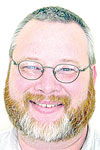Ecolonomics club comes to campus

Robert Wood – Executive Director of the Institute of Ecolonomics
In 1997, the ecolonomics certificate program was introduced to Missouri Southern. The certificate said a student needed 13 credit hours to receive the certificate. In the spring of 2005, ecolonomics became a minor.
Ecolonomics’ main mission is to demonstrate that creating a mutually beneficial relationship between a strong economy and a healthy ecology is the only formula for a sustainable future,” said Robert Wood, executive director of the institute of ecolonomics.
Ecolonomics is a non-profit organization which believes in order to have a future that can be maintained, one must first preserve the resources one already has. It is a mixture of ecology and economics.
The Institute of Ecolonomics has many projects to inform the public about creating a healthy environment for a better future. For example, some of its events include the ecolonomics conference, and the Drive for Life. The IOE is working to create community development. It wants to keep the environment in good condition so the future will be clean so the natural resources will be useful to future generations.
John Knapp, professor of geophysics, said it is important to get involved in ecolonomics simply because “it is the future.”
There is an ecolonomics club at Southern called the International Student of Ecolonomics Association (ISEA). The times and dates of when the club meets have not been scheduled yet; they will be released at a late date.
The ecolonomics program consists of about 15 students per year as well as a group of faculty members from many different departments such as the biology, business and social sciences departments.
The program finds projects the students could not complete and puts them into action around the Southern campus. The ISEA’s goal is to complete one to two projects per year.
Ecolonomics is looking to grow in 10 years.
“It’s about having a good balance,” Wood said. “We don’t want to waste the resources we have.”
The program was founded by actor Dennis Weaver, a former student at Southern.
Your donation will support the student journalists of Missouri Southern State University. Your contribution will allow us to purchase equipment and cover our annual website hosting costs.



























